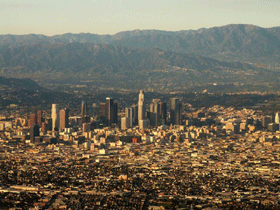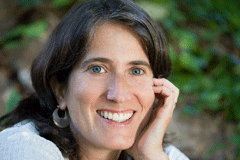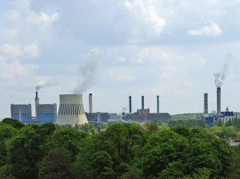Climate Change and America’s Poor
Air Date: Week of June 12, 2009

In Los Angeles, blacks are twice as likely to die during a heat wave than other city residents. (Photo: Storm Crypt )
Climate change will hit the poor and disadvantaged the hardest, not just in developing countries abroad but also here at home. A new study from the University of California, Berkeley has found that low-income communities and people of color in the United States will suffer the most from the health and economic consequences of rising global temperatures. Study co-author Rachel Morello-Frosch talks with host Jeff Young about how this climate gap works and how we can close it.
Transcript
YOUNG: The effects of climate change would likely hit hardest in places with the fewest resources to adapt. And we're not just talking about the developing world or tiny island nations.
University of California-Berkeley environmental health scientist Rachel Morello-Frosch studied low-income communities in the U.S. and found something she calls a climate gap.

Report co-author Rachel Morello-Frosch.
YOUNG: Let’s take a closer look at a couple of these. The most obvious, I guess, is the warming part of global warming. And you studied heat waves. And I found this pretty striking, that in Los Angeles, a black Angelino is twice as likely to die during a heat wave compared to the rest of the city. Why is that?
MORELLO-FROSCH: Well there are a lot of reasons for that. We’ve done some analysis in California that shows that communities of color and the poor live in neighborhoods that have less tree canopy which would protect them from heat and have a larger proportion of coverage of impervious surface like concrete and pavement which is gonna increase surface temperatures where they live. And they’re less likely to own things like air conditioning that can help them cool off. The other issue is that African American communities, particularly low income African American communities often have pre-existing health conditions that make them more vulnerable to heat waves such as high blood pressure, diabetes, chronic heart disease, asthma and these kinds of things. And extreme heat waves can be exacerbated.
YOUNG: Now what about the fact that these are already areas that suffer bad air. How might that change if things get warmer?
MORELLO-FROSCH: Well one of the pollutants is very sensitive to hotter temperatures is ozone, which we know can cause respiratory problems and enhanced mortality risks. And so when the weather gets hotter the pollutants that are in the air, the volatile organic compounds that come from car emissions and industrial emissions mix with other chemicals to create ozone. And when it gets hot that chemical reaction increases and the levels of ozone are expected to go up as surface temperatures increase.
YOUNG: And, again, this is something that I’m guessing is going to affect a lot of people. But what you’re finding is those most affected are again poor communities, low-income communities, communities of color.
MORELLO-FROSCH: Yes, so air quality overall is gonna be worse for everyone, but the reality is that a lot of the sources of pollution are disproportionately located in low-income communities of color. And so the levels of pollutants, the localized hot spots as we call them, are gonna be even worse in those neighborhoods that are disproportionately hosting a lot of the major pollution sources, the large industrial facilities, the refineries, the power plants, the major transportation corridors and the highways. Those communities are expected to be even more acutely affected by degrading air quality as a result of climate change.

Rising temperatures are expected to make the dirty air in many low-income neighborhoods even dirtier.
MORELLO-FROSCH: Well, I think that that argument is essentially problematic. If we look at the issue of energy costs, for example, energy costs are gonna go up as a direct result of climate change itself if we do nothing and follow a business as usual scenario. Similarly climate change and water flow and droughts are gonna make it much more difficult for power plants to run efficiently. The increased costs of that energy production are inevitably going to get passed down to consumers. And those that are gonna be disproportionately impacted by those increased costs are low-income households that pay a higher proportion of their income for energy costs. So the do nothing scenario is gonna disproportionately impact the poor and is likely to be worse than any mitigation strategies that we move forward with to address climate change.
YOUNG: We can’t pretend that energy costs won’t be affected by reducing greenhouse gas emissions, can we?
MORELLO-FROSCH: Yes, either way low-income consumers are gonna pay higher energy costs. But at least when we have a policy in place and a revenue stream generated, we have the resources to cushion the blow for low-income consumers.
YOUNG: Rachel Morello-Frosch is an associate professor of environmental science at the School of Public Health at the University of California Berkeley. Thank you very much for your time.
MORELLO-FROSCH: Thank you so much.
[MUSIC] The Orb “The truth Is…..” from The Dream (Six Degrees 2009)
YOUNG: Coming up: some Californians fight climate change with forests and they're turning a profit--maybe money does grow on trees! Keep listening to Living on Earth.
Links
Read “The Climate Gap” report.
Learn more about Rachel Morello-Frosch’s policy recommendations here.
Living on Earth wants to hear from you!
Living on Earth
62 Calef Highway, Suite 212
Lee, NH 03861
Telephone: 617-287-4121
E-mail: comments@loe.org
Newsletter [Click here]
Donate to Living on Earth!
Living on Earth is an independent media program and relies entirely on contributions from listeners and institutions supporting public service. Please donate now to preserve an independent environmental voice.
NewsletterLiving on Earth offers a weekly delivery of the show's rundown to your mailbox. Sign up for our newsletter today!
 Sailors For The Sea: Be the change you want to sea.
Sailors For The Sea: Be the change you want to sea.
 The Grantham Foundation for the Protection of the Environment: Committed to protecting and improving the health of the global environment.
The Grantham Foundation for the Protection of the Environment: Committed to protecting and improving the health of the global environment.
 Contribute to Living on Earth and receive, as our gift to you, an archival print of one of Mark Seth Lender's extraordinary wildlife photographs. Follow the link to see Mark's current collection of photographs.
Contribute to Living on Earth and receive, as our gift to you, an archival print of one of Mark Seth Lender's extraordinary wildlife photographs. Follow the link to see Mark's current collection of photographs.
 Buy a signed copy of Mark Seth Lender's book Smeagull the Seagull & support Living on Earth
Buy a signed copy of Mark Seth Lender's book Smeagull the Seagull & support Living on Earth

